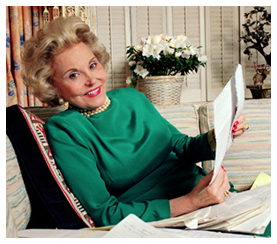Ann Landers. Growing up, I read her column every day.
Dear Writers, Artists, and Book-loving people of all types;
This is my first “Ask Elaw” column, which aims to answer some of the questions I’m posed at conferences, on Twitter, and by my clients. I hope you find it helpful! I have several more of these columns in the pipeline, and I’d love to hear from you with your questions – or with your comments on my answers. Feel free to post in the comments section below, or send your questions via my website, Elawreads.com
Dear Elaw,
I met an agent at an SCBWI conference who fell in love with my book. She practically wanted me to sign a contract on the spot! (Not really - but she did take my full manuscript to read it.) She sent me an e-mail a few days later to say that she had suddenly gotten very busy, but was looking forward to reading it. That was 3 months ago, and I haven’t heard a thing. What’s the best way to follow up? Now I’m kicking myself for waiting so long to check in.
Conferences are exhilarating and encouraging...but real life hits hard when you're back at your desk.
Dear She Never Called, She Never Wrote,
Eek. I’ve been guilty of doing that myself, of showing interest and then not getting back to someone when the demands of a hectic office supplant the supportive, invigorating atmosphere of a conference. All you have to do to follow up is sent a gentle, friendly note saying “I just wanted to check in and see if you have any thoughts on my manuscript, which, so you won’t have to go hunting, I re-attach.” (Always make it as easy as possible for an editor to answer you). If you don’t hear back, or don’t get an actual answer, I would nudge again, gently, in another 6 weeks but I would also feel free at that point to submit elsewhere. I wrote an entire blog entry on this question if you’d like more detail.
Dear Elaw,
Sadness, from the movie Inside Out
I’ve “beaten the odds” and managed to sell two young adult novels. Both received nice reviews (the second was starred by Publishers Weekly) but neither sold well enough to warrant a paperback edition. Since my sophomore title pubbed in 2014, I have been floundering. I wrote a third YA novel in a very different style that hasn’t been picked up by any publisher and, though I continue writing in spurts, I am struggling with bouts of uncertainty. Have my mediocre sales numbers rendered me unpublishable? Is publication of another midlist title worth the effort and angst? Do I believe in writing anymore? Is it time to give up?
I am sincerely hoping your reply will involve a pep talk.
Dear Slumped Over Your Desk,
Of course it’s not time to give up, but I know what a tough time in your career this is. Before they get their first contract, so many writers imagine that finally breaking through to publication will be the end of their years of struggling.
I wish I could show you the number of well-known, successful authors who have talked to me when they were discouraged, frustrated, or mad, and wanted to quit. Now that I think of it, that’s practically every artist and author I know! Lisa Yee told me she still has career doubt, as in “will I ever publish again?” doubt, after 16 books.
"Art isn't easy" sings Mandy Patinkin in this number from Sunday in the Park with George
The thing to do, I promise you, is keep writing what you care about. I’ve been friends with Melissa Sweet since she was an unpublished illustrator, and now, with two Caldecott Honors and two Siebert Awards to her name, she freely admits to often getting very discouraged. She says, “it's part of the creative process and a creative life.”
If only we could all keep blinders on and just do what Melissa recommends, “Try to remember, the book is not the thing, it's making the book.”
I also recommend good drugs.
Dear Elaw,
My friend asked me to read her manuscript and….I hate it. I’m mad at myself for offering, because now I don’t know what to say, and we’re really good friends (I’d never read anything of hers before). Do you have any suggestions for how to give feedback? More specifically, is there a way for me to gently tell her what I think without really telling her what I think? (She’s been so frustrated by agent responses and I think I know why…)
Dear Tongue-tied in Tennessee,
Editor Alison Weiss of Sky Pony Press
Editors have all had a lot of practice at this over the years, so sure, I can help! First, start by saying three nice things, even if they are very small (e.g. “Giorgio is a lovable cat!” “Kids will all relate to the scene on the bus” “you’ve selected a timely topic). Then pick out the two biggest things—the things you think would really make a difference—to suggest she revise. Is it that she is talking too much and not showing? Does every moment in the book sound the same? Is she trying too hard to sound hip? Whatever, just pick two things to talk about, and then end with something encouraging, like “I’m impressed with how much you’ve done so far, and I know you’ll keep going.” That’s it! The editor’s secret formula: Praise at the beginning and end, and a couple of key revision points in the middle.
And for people reading this question who have that next-door neighbor who has written and illustrated a picture book that you know is a complete beginner’s effort? Tell them to join the SCBWI.org and look at Harold Underdown’s website. Those two places are godsends where people just starting out can get information—instead of hearing bad news from us!



